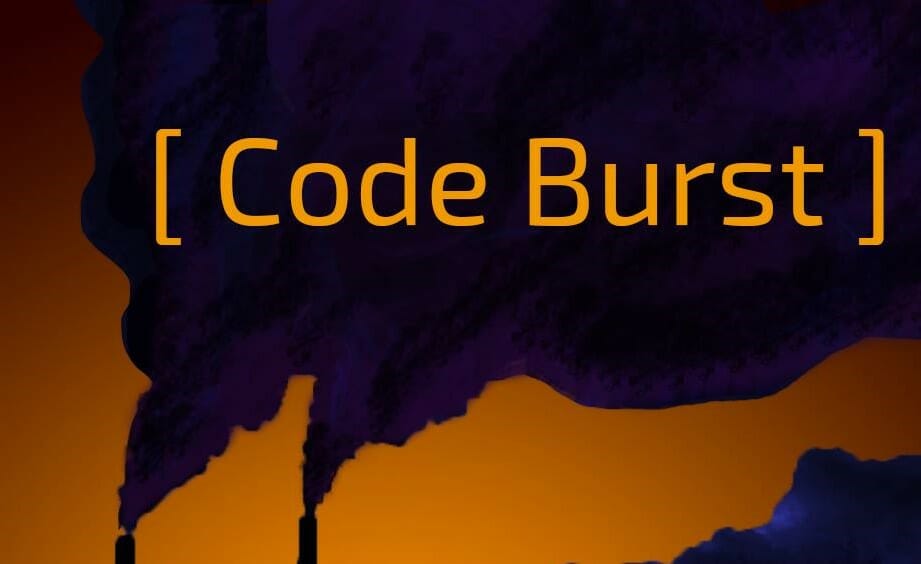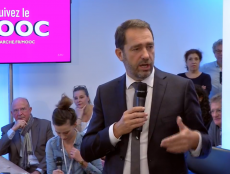
Articles
Editor’s Picks
Code Burst: Former Mined Minds Apprentice Susan Graves Puts on Her CPA Hat
By Henry Kronk
September 16, 2019
“From what I could tell, the Mined Minds apprentices were being paid from the for-profit, but were being counted as apprentices of the non-profit. So in order to have a clear trail of doing that there would have to be money exchanged back and forth, or the money would be commingled, which is like, huge, no, no. So, you know, I hope to god they didn’t do that. So I know that if they if they were ever audited by the IRS, that would be an issue. And that, you know, by doing things that way, that tells me as a CPA, that that’s probably not the only thing that they’re commingling or that they’re, you know, paying one out of the other or, you know, robbing Peter to pay Paul or whatever it is that they’re doing, that the payroll situation was not one income, but it’s happening in other areas of the operation.” – Susan Graves
Just a brief recap: the ongoing class action lawsuit filed against Mined Minds has been dismissed. I went over how things have gone forward in the last episode, and I also interviewed Billyjack buzzard about his experience with the organization.
Since posting someone has made me aware of the fact that in the tweet in which Jonathan Graham announced that the lawsuit has been dismissed, Stephen New, one of the lawyers who represented Ty Cook, Tori Frame, and others, has responded with a few choice tweets. If anyone is looking for a more, let’s say, nuanced legal explanation of what has gone down, I suggest you start there.
For this episode, I got in touch with Susan Graves. She went through the Mined Minds program in West Virginia. When Amanda and Jonathan started out, they said they could teach anyone to code, even out-of-work coal miners. In the last episode, we heard how Billyjack Buzzard, an out-of-work coal miner, went above and beyond as a student in the program. Even after spending five days a week learning from Mined Minds, maneuvering his work schedule around the program, and going to work for them as an instructor and developer, he was abruptly fired for highly questionable reasons. He was left unable to demonstrate his work to tech companies and, despite his best efforts, has not found a job in the tech industry.
Susan Graves also seemed like she was set up to succeed in Mined Minds. She had a background in computer science and had her own accounting practice which she could work flexibly while learning to code like Billyjack. Things did not pan out for her. I’m going to let Susan tell the rest.
This interview has been lightly edited.
Susan Graves: I am a CPA, a Certified Public Accountant, here in West Virginia, and I’ve been a CPA for about 25 years. The majority of my clients that I work with on a monthly basis are nonprofit organizations. So I’m well-versed in how a non-profit should be set up and how it should be run. I started out my career in non-profit fundraising. So I do know a little bit about that.
I am getting closer and closer to retirement. As much as I hate it, I am. And I’m always looking for some kind of revenue stream that will take me into retirement and beyond. I figure I can do taxes until I dropped dead. But I also want to have a variety of income streams. And so in June of 2016, I read a very small article in the paper about this non-profit organization that was coming to Charleston, West Virginia, to hopefully enroll students in a coding boot camp. They were having an informational meeting at the South Charleston Public Library. The article said anybody who was interested to call this number to pre-register.
I thought, ‘You know, I have a minor in computer science, and I’m very well adept in using Windows-based computers, I’ve always had an interest in coding and have known enough about it to be really dangerous. I’m going to go see what this is all about.’
So I attend the informational meeting, there were quite a few people there. Amanda Laucher, Jonathan Graham, and Marvin Laucher were there. I kind of liked the pitch that they gave. I talked to them after and made the decision that night that I was going to enroll.
Henry Kronk: If we could go back, do you remember kind of what impression you had after you left that meeting?
SG: Oh, I was very excited. Very excited. We were going to learn how to design and create apps. I really saw that as the future. For a time when I was younger, I lived in California in Silicon Valley. My brother currently works at a high-tech firm that develops apps. So I’m very, very interested in learning more about that, and just being able to be creative in a technical way. I was very excited.
HK: So then let’s zoom forward to the first class. Do you remember kind of what impression you had, what experience you had during those first few classes?
SG: Well, there were a lot of people in that first class. They did some icebreaker-type things. We played never have I ever and kind of got to know who we were in class with. It appeared that there were a lot of people that didn’t know anything about computers. There was one man that sat in the same row as me that had bought his computer for $50 at a pawn shop. He didn’t even know how to open it. Literally, he did not know how to open the screen.
I still got the feeling that they were ready to teach everybody everything that they needed to know about computers.
Senator Joe Manchin was there to welcome us and to talk about how excited he was to have Mined Minds here in West Virginia. Halfway through the class, he came running back in class with some people from Hewlett Packard. He had been visiting them, and he dragged them over to our class. He said, ‘At the end of this class, you all could be working for Hewlett Packard, with these people. They were going to be opening a facility here. And you could be the ones working for them.’
So that first class, we came out of it really pumped up and excited. I was like, ‘I’m ready to go, come on, let’s do this.’
And then then, of course, we met once a week at a local community college that had donated classroom space. After the first two or three weeks, the class size diminished greatly. Some people were very intimidated. Especially that poor man who didn’t know how to open his computer, he was lost, he was completely lost. I could tell right away that their claim of being able to teach anyone how to code, no matter what your level of knowledge of computers, really probably was not going to turn out like that. Because they did not go over computer basics. I knew that the enrollment in the class was going to drop off significantly. And it did. It did pretty quickly.
HK: Okay, and so time goes on, the class goes on. It sounds like maybe they can’t teach anyone to learn to code, so to speak, but they’re still teaching a class. Where are you at, towards the end of your time as a learner with Mined Minds?
SG: They taught us Ruby, which is a lesser-known and lesser-used programming language. Some of the programming basics we learned, I had already learned them in previous academic classes. But we did learn how to set up a function, how to call a function, how to set up a series of functions in a class, that kind of thing.
I had fully expected us to learn more of the common programming languages, in particular, HTML, CSS, JavaScript, as well as the programs that allow you to actually create an app for an iOS or an Android system.
Most of the learning was, ‘Here’s the concept. Here’s what we want you to do. Here’s what we want you to create. Now go do it.’
There was no other direction, other than, ‘If you have an issue, or if you have a problem, you need to Google it.’
I was one of the eight people who graduated. We had a nice little graduation ceremony at the state capitol, at the cultural center there. Senator Manchin was there with lots of news stations and all of that.
I completed everything for the class. I didn’t have a whole lot of problems, but there were a couple of concepts that I really had to work at. But that kind of stuff comes easy to me. So I was looking forward to hopefully being accepted as an apprentice and learning even more working on real-life situations, rather than building tic tac toe.
I was assigned a work partner and we started out working on a redesign of a website for an existing company. They had a graphic designer who had basically designed the website. We needed to make the website look exactly like what the graphic designer had done.
HK: And did you feel prepared to take that on when you started going?
SG: Oh, I was very intimidated. I was very nervous about it. That job was pretty much 100% HTML, CSS, and JavaScript. I was somewhat okay with HTML and CSS, and I felt zero confidence with JavaScript. So it was tough. It was tough.
One of the things that they had—and this was really unsettling—they had a video monitor on in the Clendenin office during working hours so that they can see and hear everything that we were doing.
HK: Really? And it fed into their laptop or something like that?
SG: Yeah, there was also a monitor in the Waynesburg [Penn.] office at that time. They could pull up the feed on their computers. So they would be able to watch us at any time
to see what was going on.
There was one occasion where we were all working, on a day after we had all turned in our time. We had to have it in by a certain time in order to get paid, which is really common. All of a sudden, Amanda came on the screen and said, ‘Somebody in the Clendenin office has overstated their time. And if that person doesn’t fix it, they’re getting fired.’
So we all just kind of sit back and look at each other like, ‘Was it me?’ Overstating your time didn’t necessarily mean that you were going into overtime. You know, overstating your time meant that you were putting in time for which you couldn’t provide any work product. That is not the way to go about solving a problem like that. We were all processing and wondering why is she conveying this out to everybody when it was one person? And she could just text that one person and say, ‘Hey, look, I need to talk to you about your time,’ rather than publicly saying, ‘Whoever did it, and you know who you are, you got to change it or you’re fired.’
HK: Yeah, seems pretty harsh. Do you think there was maybe anything behind that decision to make that statement?
SG: Power. I think it was a power play. The working environment was very much like that. You never knew when you would get disciplined for something that you didn’t realize that you were doing.
HK: So as time went by, from what I understand, you were both doing this development work. But because of your experience with non-profits, you are also spending time with Amanda and Jonathan talking strategy in that regard, with their own organization, right?
SG: Once I became an apprentice, they realized that they were not registered to do business in the state of West Virginia. So I actually set up the Mined Minds Foundation as a foreign entity doing business in the state. I got their their Secretary of State filing, their business registration filing, and, you know, all of the various tax department, unemployment, that kind of stuff that that has to take place.
There was one long call that I had with Amanda. We were talking about grants, and what a non-profit organization needed to do internally in order to be able to facilitate a large grant. They told me that they were in the process of applying for a large grant from the Appalachian Regional Commission, which is a federal entity, and that they wanted to be the lead organization applying for that grant.
That would mean that they would act as a ‘fiscal agent,’ and then the money would flow down from the federal government into Mined Mind’s books and then be distributed to their partner organizations.
This was a large grant of over one million dollars. In order to be eligible to be able to facilitate a federal grant of that size, you have to have all your ducks in a row. You have to be prepared to follow all of the policies and procedures that the federal government requires, in addition to what you have instituted for your own organization.
I had already been joking with them that they keep no records.
HK: And it suddenly became not very much of a joke anymore …
SG: Right, exactly. I flat out told them: ‘Okay, number one, I do not recommend you be the lead on this ARC grant because you’re going to have to change the entire way that you do business. And it’s going to be hard changes. I don’t think you you have the capacity right now, to be able to do that. Let somebody else be the lead. And then just apply to that other organization for funds that you need as you work toward the goals of the grant.
I said, ‘Please don’t be the lead on this grant. It’s just a horrible idea.’
So they actually took my advice. I don’t think they realized that they would actually have to change everything they do. They would have had to change almost their entire business model to be eligible.
They have the nonprofit organization, but then they also had a for-profit consultancy. Okay, first of all, I never looked at their accounting records. But from what I could tell, apprentices were being paid by the for-profit, but being counted as apprentices of the non-profit. Our 1099s were from the non-profit, even though all of the payments that we received were from the for-profit. So in order to have a clear trail of doing that, there would have to be money exchanged back and forth. Or the money would be commingled, which is a huge no-no. I hope to God they didn’t do that.
If they if they were ever audited by the IRS, that would be an issue. That tells me as a CPA that that’s probably not the only thing that they’re commingling or that they’re, you know, paying one out of the other or robbing Peter to pay Paul or whatever it is that they’re doing. That payroll situation was probably not the one instance, but it’s happening in other areas of the operation.
They did not have strong policies and procedures in place. I know, that sounds like all those accountants being picky, but there’s a reason to have all of that. And if you don’t have it, you’re not going to succeed in the non-profit world.
One of the major concerns that I immediately had was the first time that they had us fill out paperwork in order to be paid. Typically, when you start a new job, you have to fill out that god-awful W-4 form, and nobody really knows what to put on there. But they had us fill out a W-9 form instead. That told me something completely different.
A W-9 form is is a vehicle for an employer to get your name, address and social security number or your federal ID number. We were going to be paid as contractors, not as employees.
There’s a big distinction. I gotta put my CPA hat on for this one. The IRS has a 21 point guiding list as to whether or not someone is an independent contractor or an employee. And some of those things are ‘Does the employer control the work product?’ ‘Does the employer control the schedule?’ ‘Does the employer provide all the tools?’
For example, if you’re a hairdresser, and you go to work at a hair salon, and you rent a booth,
and you make your own appointments, your customers pay you.
And then you either pay a percentage of what you bring in or a set amount for your booth grant/ That makes you an independent contractor,
But if appointments are made at the front desk, if you are given hours that you’re supposed to be there, and, when people leave, if they pay at the front desk, and then you receive your portion of that after the rents taken out, you’re an employee.
That’s because the employer controls the schedule, controls the money, and basically controls the work product.
In our case, we brought our own laptop to work on. So we were bringing our own tools to work on. That is in the favor of the independent contractor.
However, our time to be there at the Clendenin office was strictly controlled. We had to be there at a certain time and we couldn’t be late. Also, we did not control our work product—that was monitored on a day-to-day basis. We had to report back where we were. They had had the right at any time to come in and look at what we were doing.
Because they had so much control, if audited by the IRS, they would never get away with with the apprentices being paid as independent contractors.
Now, the attraction of having everybody paid as independent contractors is that [Mined Minds is] not liable for payroll taxes, for employment insurance, for workers comp, or any of those extra expenses that come with having employees. With an independent contractor, you just write them a check for $500. And they’re responsible for their taxes, whatever those may be.
So we were paid as independent contractors. Now, with my existing practice, I am always paid as an independent contractor. So I knew that I was set up to be able to handle this extra income and not incur a huge tax debt. One of the biggest problems in my tax practice is when somebody brings their taxes in and they have a 1099 miscellaneous, which is given at the end of the year to each independent contractor according the amount of income that they earned.
Most people don’t realize that, when you get a 1099, or you’re paid as an independent contractor, not only are no taxes withheld, but there are other taxes that are incurred that you’re also responsible for. So when you get income like that, it seems like your tax bill goes up from maybe you know, an effective rate of 10%, to what may seem like 35 or 40% unless you plan accordingly. So I tried to advise everybody about how to set up how to set themselves up and what to keep track of in order to minimize the taxes that they’re going to have to pay.
It really bothered me that they declared us as independent contractors, because we weren’t. We were employees, not independent contractors. And I know that that may seem like a small thing. But in my world, that’s a big thing. That’s a real big thing.
HK: So let me see if I can understand this. Not only were Mined Minds not complying with correct practices regarding how they pay their employees and file their taxes, they were also setting their apprentices up for a future situation in which they would incur quite a bit of tax debt. And the apprentices weren’t necessarily prepared to deal with that.
SG: Exactly. You know, you get a 1099 for $10,000. Some people earned that and more. That’s a huge chunk of change on change on your tax return. The majority of people weren’t working before, they didn’t have the money to be able to pay these taxes. The people I helped out all had to file installment agreements. And they’re still paying for them.
That that issue probably bothered me more than anything else.
HK: So unlike a lot of people who went through the program, you parted ways fairly amicably. Is that right?
SG: Yes, I did. There was a day in June of 2017 when Jonathan came to the office by himself. We knew that, when that happened, something was going to happen. He was there for a reason, Amanda wasn’t the type to deliver bad news.
He had meetings with all of us individually. One person was fired, and I went next. Jon asked me how I thought things were going, how I was managing. I worked for Mined Minds all through tax season, which was a little difficult. And I had also been diagnosed with an autoimmune disease and, on top of all that, my mother had had a major heart attack.
HK: Oh my god.
SG: Yeah, it was kind of a stressful time. I told him I was doing okay, but that I really wish that I had more time to devote to personal development, because, you know, it interests me, and there are certain areas that I really want to focus on and learn more. But at times, I need to choose whether or not to work on something or accept a new client. It was kind of a catch-22.
Out of the next breath, he said, ‘Well, we’ve decided to end your apprenticeship, but we’d like you to stay on for another two to three weeks to get things wrapped up.’
I was like, ‘Oh … oh.’
HK: It took you by surprise.
SG: It took me very much by surprise. A week earlier, Jon had asked me to help them increase their client base in the Charleston area. I had had a lot of ideas about how to do that. But anyway, I went back to the others and told them I’d just got two or three weeks’ notice. It took me a couple days to really process it. I had some conversations with some of the people that did not get talked to that day. I was really upset about the whole thing, even though there was this hostile work environment, and all this other stuff. I enjoyed the work and enjoyed the opportunity to learn and, and e
It was like, ‘They don’t want me anymore,’ you know, that kind of thing. In the meantime, one of the guys had talked to Amanda and told her that I was upset about having to leave.
She called me and said, ‘Well, you know, you don’t really have to leave. We thought that you felt that you weren’t able to service your CPA clients and this, that, and the other. You don’t have to leave.’
So, I was like, ‘Okay, cool. That’s great.’ But then, two weeks later, my puppy pulled me off of my front porch. I severely broke my arm and shoulder, which required hospital stay and two surgeries.
HK: Oh my god. That must have been a really tough period.
SG: Yes, it was. After that, I just never went back.
HK: Right. So looking back now, how do you view your experience with Mined Minds?
SG: Overall, and given the fact that I’m not doing any coding at all, it was an absolute waste of time. Sure, I gained some knowledge about Ruby, which is almost never used anywhere. If I applied myself, I could do an online course for another language.
But at this point, I have no desire to apply myself to do that. I know that they have said several times in comments that some of the students got something from them. They were able to change jobs or work in a different working environment, or that kind of thing. That didn’t apply to me at all. I was older than both Amanda and Jonathan, and had more work experience than the both of them put together. So that absolutely didn’t apply.
If I had to do it all over again, I probably wouldn’t have. Now, I will say that the people that were in the cohort were absolutely wonderful people, and I’m still in touch with many of them and consider them dear friends. So that’s probably the only positive thing that came out of this situation. And I have a framed certificate on my wall that says I’m a full stack developer. That’s about it.
HK: Well, Susan, thanks so much for getting in touch with me today.
SG: You are very welcome. I’m more than happy to participate.
I’d like to thank Susan and all the other former learners at mind mines who have been in touch with me lately. This show’s logo was designed by Katrina Gibbs, and the music you heard was made by Daniel Monkman, who is currently playing as Zoon. Since the first episodes of Code Burst came out, Dan has signed with a label and put out an album called Bleached Wavves. Zoon is currently working on a follow up album, and that will be available in the near term.
If anyone would like to get in touch with me, please follow me on Twitter or send me an email: [email protected].
Featured image by Katrina Gibbs.









No Comments